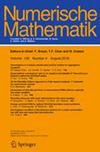Analysis of the single reference coupled cluster method for electronic structure calculations: the full-coupled cluster equations
IF 2.2
2区 数学
Q1 MATHEMATICS, APPLIED
引用次数: 0
Abstract
Abstract The central problem in electronic structure theory is the computation of the eigenvalues of the electronic Hamiltonian—a semi-unbounded, self-adjoint operator acting on an $$L^2$$

电子结构计算的单参考耦合簇法分析:全耦合簇方程
电子结构理论的中心问题是电子哈密顿算子的特征值的计算,哈密顿算子是作用于$$L^2$$ l2型希尔伯特空间上的反对称函数的半无界自伴随算子。耦合簇(CC)方法基于广受欢迎的特征函数的非线性参数化,并导致非线性方程组,是高精度量子化学模拟的首选方法。现有的耦合聚类方法的数值分析依赖于CC函数的局部强单调性,该特性仅在摄动状态下有效,即当追求的基态CC解足够接近于零时。本文介绍了一种基于CC导数可逆性的单参考耦合聚类方法的适定性分析方法。在最小假设下,我们所追求的特征函数是中间可归一化的,相关的特征值是孤立的和非退化的,我们证明了连续(无限维)CC方程总是局部适定的。在相同的最小假设下,假设离散化足够精细,我们证明了离散的Full-CC方程是局部适定的,并且我们导出了具有保证正常数的基于残差的误差估计。初步的数值实验表明,我们的估计中出现的常数比局部单调法得到的常数有显著的改进。
本文章由计算机程序翻译,如有差异,请以英文原文为准。
求助全文
约1分钟内获得全文
求助全文
来源期刊

Numerische Mathematik
数学-应用数学
CiteScore
4.10
自引率
4.80%
发文量
72
审稿时长
6-12 weeks
期刊介绍:
Numerische Mathematik publishes papers of the very highest quality presenting significantly new and important developments in all areas of Numerical Analysis. "Numerical Analysis" is here understood in its most general sense, as that part of Mathematics that covers:
1. The conception and mathematical analysis of efficient numerical schemes actually used on computers (the "core" of Numerical Analysis)
2. Optimization and Control Theory
3. Mathematical Modeling
4. The mathematical aspects of Scientific Computing
 求助内容:
求助内容: 应助结果提醒方式:
应助结果提醒方式:


